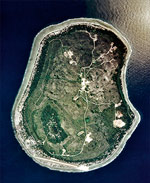- Clean production and equitable distribution
- > To ensure that ocean mining does not escalate into a competition for the most promising claims, a UN agency administers the marine minerals in the international seabed area, ensuring that the environment is protected and that developing countries can share in the benefits. Commercial activities in coastal states’ waters, however, are regulated by national law. As the offshore oil industry shows, this does not always afford adequate protection for the environment.

Can commercial exploitation of marine minerals be safe and equitable?
There are many signs that 2016 will mark the start of marine mining in the international seabed area, with the commencement of manganese nodule harvesting. This will open a new chapter in the commercial exploitation of marine resources, for the minerals in the international seabed area do not belong to individual states but are defined as the common heritage of mankind, and, according to the United Nations Convention on the Law of the Sea (UNCLOS), their benefits are to be shared equitably. UNCLOS is the most comprehensive international treaty ever concluded. It has been ratified by 165 states and the European Union and came into force in 1994. The International Seabed Authority (ISA) was established in Jamaica at the same time. This UN organization ensures that the marine minerals found in the international seabed area are equitably distributed and that developing countries can also share in the benefits. States wishing to extract marine minerals from the international seabed area must apply to the ISA for an exploration licence. To date, the ISA has issued 25 countries with exploration licences, which contain clear rules and environmental standards. Once exploration has finished, parts of the explored area must be relinquished to the ISA and are reserved for developing countries. ISA regulations governing the commercial exploitation of marine minerals are expected by 2016, initially for manganese nodules, and then for massive sulphides and cobalt-rich crusts. Only then can exploitation begin. The ISA’s work is regarded as exemplary, for it is the first time in history that rules, regulations and procedures have been adopted before exploitation begins. It is also notable that within the future mining areas, the ISA has defined zones for the protection of deep-sea fauna, where extraction of marine minerals is prohibited. Environmentalists criticize the fact that at present, pursuant to UNCLOS, the ISA cannot extend protected status to any zones outside the mining areas; they argue that the ISA is ideally placed to do so. The critics are therefore calling for UNCLOS to be amended. In the waters under the jurisdiction of coastal states, there are no uniform rules applicable to marine mining. Under UNCLOS, every state is obliged to protect and preserve the marine environment, but in many places, the oil industry or effluent from land installations is causing severe pollution of the marine environment, partly because the authorities are too lax in their controls. Environmentalists view marine mining as a further source of disruption. A lack of controls is particularly worrying if a state allows “ultrahazardous activities”, such as the operation of nuclear power plants or offshore drilling rigs, to take place in the area under its jurisdiction. Often, incidents at installations of this kind affect neighbouring countries as well, resulting in legal disputes between countries over compensation claims. Jurists are calling for “strict state liability regardless of fault” for states engaged in any kind of ultrahazardous activity, in order to facilitate international justice. At present, injured parties often obtain little or no compensation. Currently, an effective liability regime exists only for tanker incidents; this was established many years ago under the International Convention on Civil Liability for Oil Pollution Damage. The Convention also introduced a liability fund to which oil-importing countries contribute. Under the Convention, the shipowner is liable if an incident occurs, whether or not he is at fault. If the claims exceed the sum insured, the fund comes into operation and provides compensation. This liability regime could serve as a model for other industries, such as offshore oil production.

